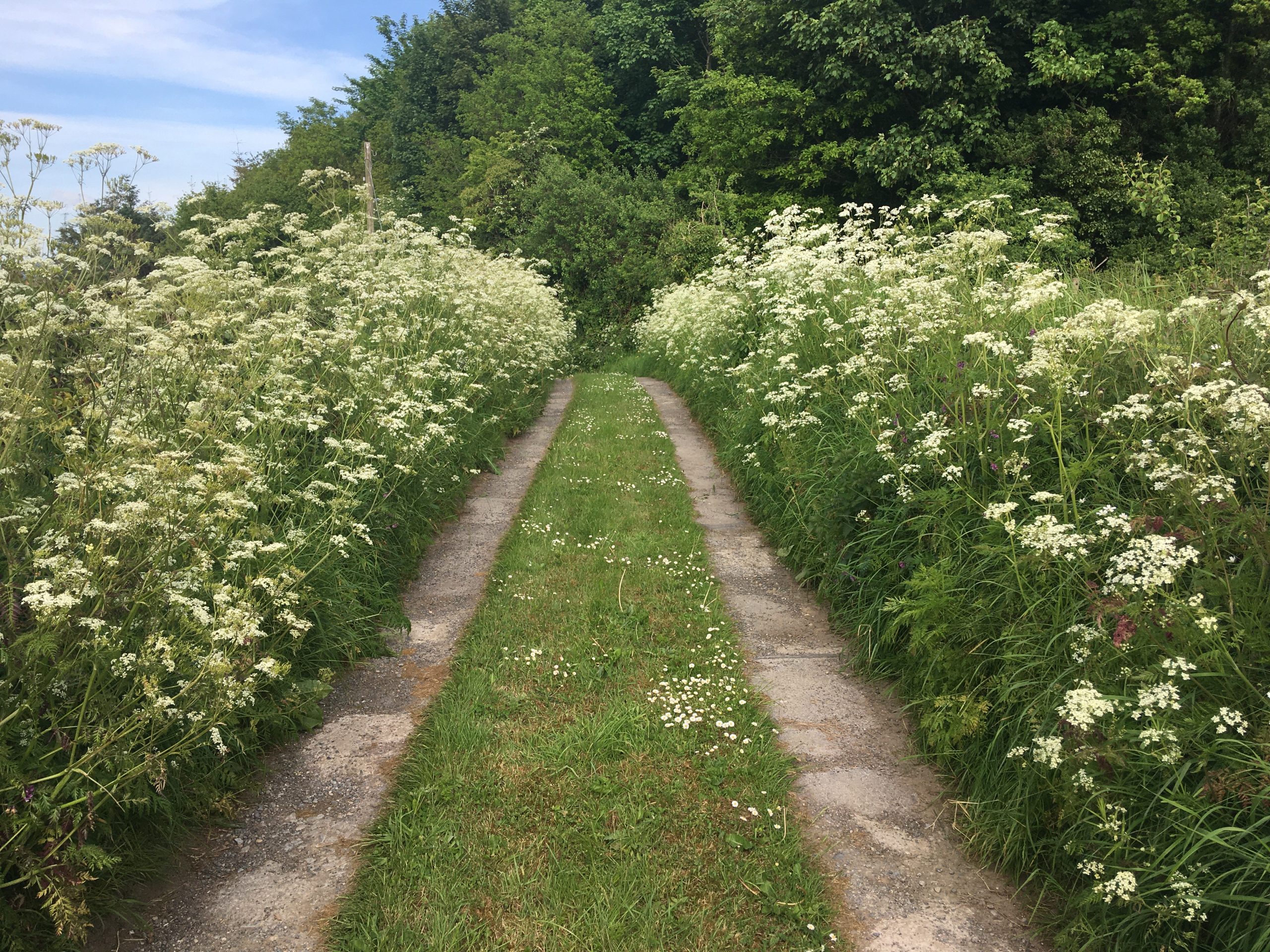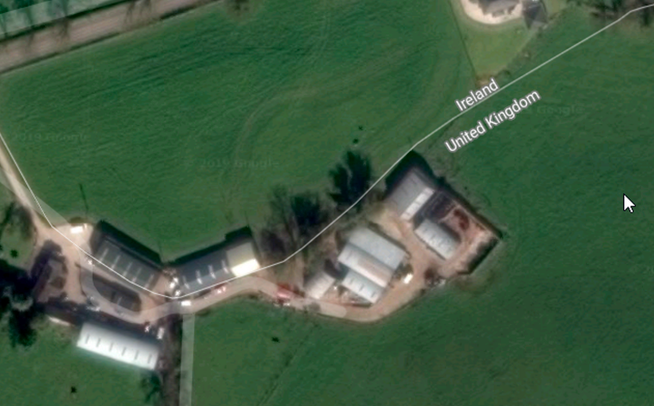6 March
We did a quick count as we organised our bags on the pavement around our feet. The bus closed its doors and drove away. At that exact moment, a woman greeted us with a hearty roar.
‘You’re home again, then? Have you been away long?’
I looked up in confusion. The woman who was speaking was not anyone I knew.
After a few minutes of enthusiastic chatter, I realised that I did indeed recognise her. She was the woman who had sat beside us in the bus shelter last November. That day the X8 was running late. We understood that there had been heavy traffic when the bus left Dublin, so it had been behind schedule all along its route. We were on our way to Cork to catch a flight. We had plenty of time so we were not worried about the bus being late. The woman was not going anywhere. She was only sitting in the bus shelter to be out of the rain. She claimed it was as good a place as any to wait for the rain to stop. She told us about her brother in Manchester who was dying. She thought it was The Cancer but she said that no one was telling her straight. She had been to see him once and she thought she might need to go again before it was too late. In a serious low voice, she informed us that it is no good going to see someone when that person is already dead. They won’t appreciate your visit nor your love if you just travel to see them when they are dead and in the box. She said that is the easy way for people to show like they care. The woman said she completely understood that kind of behaviour from people. She understood it and she accepted it because as we all know it is no fun visiting a dying person. She said that it is no fun because there is not much to talk about.
The person who is nearly dead has no future and you do, so every conversation is going to be a bit skew-whiff.
The woman talked and talked and she rarely paused but when she did pause she asked a question. She might have been twenty-eight or she might have been forty-five. It was not easy to to tell. She quickly found out that we were flying to London, but also that we lived here and that we were only going over there for a book fair. She said she was happy about that. She was happy that we would be coming back. She felt it was important to have people from different places living in Tipperary because it made the area more like the world and less like a village. She felt that too many people had already married their cousins and that the whole county was in sore need of fresh blood, just the same way as farm cats need to be refreshed before they all become inbred and end up getting stepped on by a cow because they are too stupid to move out of the way. The woman covered a lot of conversation in every gust of talking.
I had not seen the woman again since that day in November. Now it was March. I would not have recognised her at all, but when she started talking I knew her voice. She recognised us immediately, and she started right in as though we had all been talking together this day last week. She reported that she was just back from Manchester herself, but this time it had been for The Brother’s funeral. She said he lasted longer than anyone had expected and longer than anyone had even hoped for. No one had expected him to live till Christmas, but he did. She said he was no more than a shell when he died. She herself had only been back a few days but when she arrived home from the funeral and the flight, she had stepped off the bus and walked right down to the Aldi and bought herself a Shepherd’s Pie for her tea and she reported that it was lovely and full of carrots and peas and it was just what she needed after the plane and the bus and arriving home into a cold house. She said her boyfriend was useless so she knew there would be nothing to eat and that he would not be there to welcome her anyway. She recommended that we do the exact same thing. The woman assured us that ‘s Shepherd’s Pie is not something that you will ever regret.’
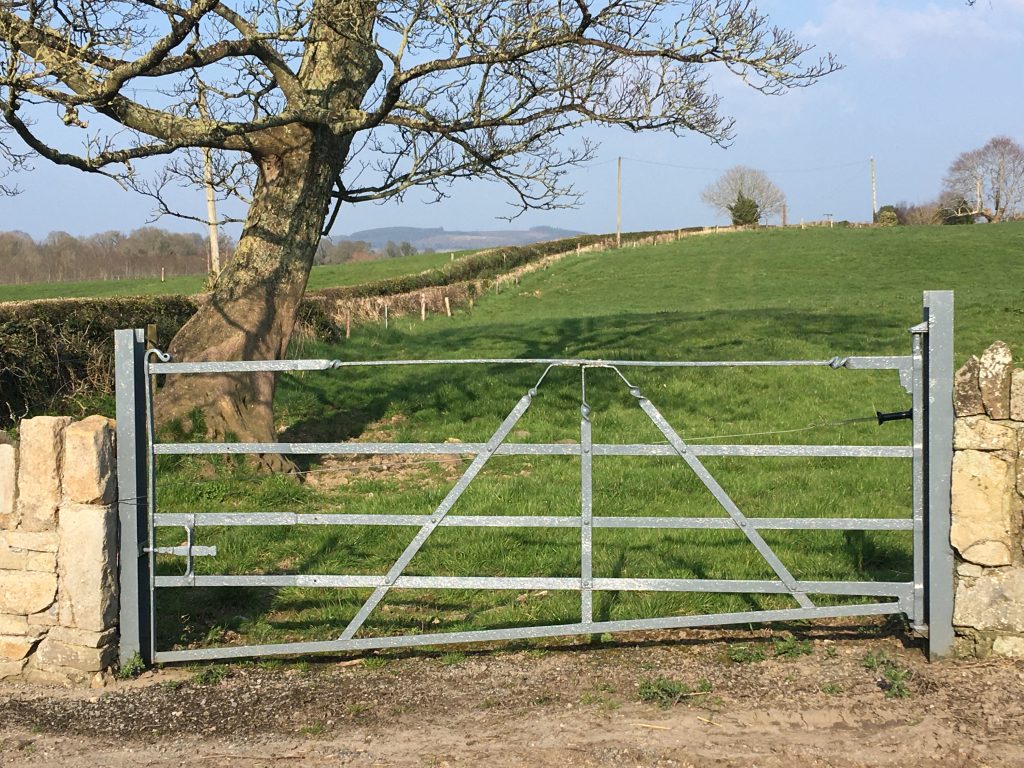
21 March
The gate at the end of the boreen was constructed to follow the uphill slope of the land.
23 March
There is a cow in Joe’s field with red tape on her tail and red tape around each of her back legs. None of the other cows have any red tape. I would like to know what this means and what her problem is. The chances of me bumping into Joe to ask about the tape are slim. I wonder about the cow and her red tape each time I pass.
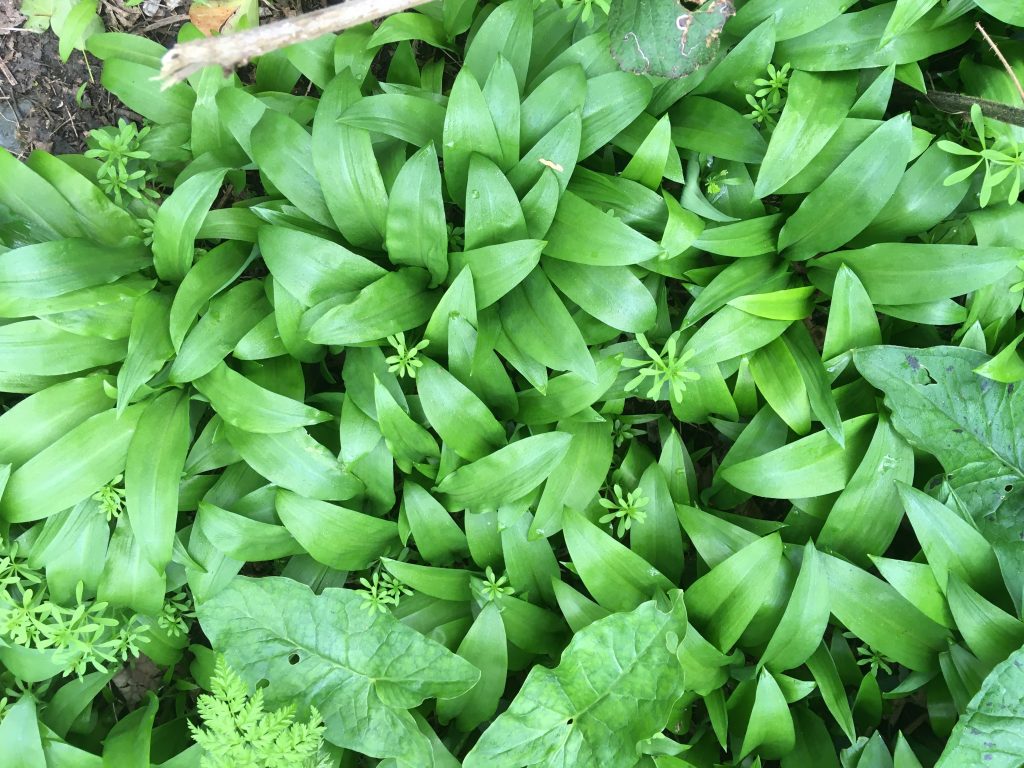
28 March
We are eating wild garlic at least twice a day. So far it we have not eaten it for breakfast.
I keep a pitcher full of leaves on the counter. We use it as a garnish. We make pesto. It is mixed in some way with just about everything we eat. When I go out to gather more, it is a form of shopping. Each time I must decide where to get my leaves today. Under an apple tree? Under which apple tree? Near the water butt? Down the edge of the path? This is shopping. These are the decisions that keep me busy.
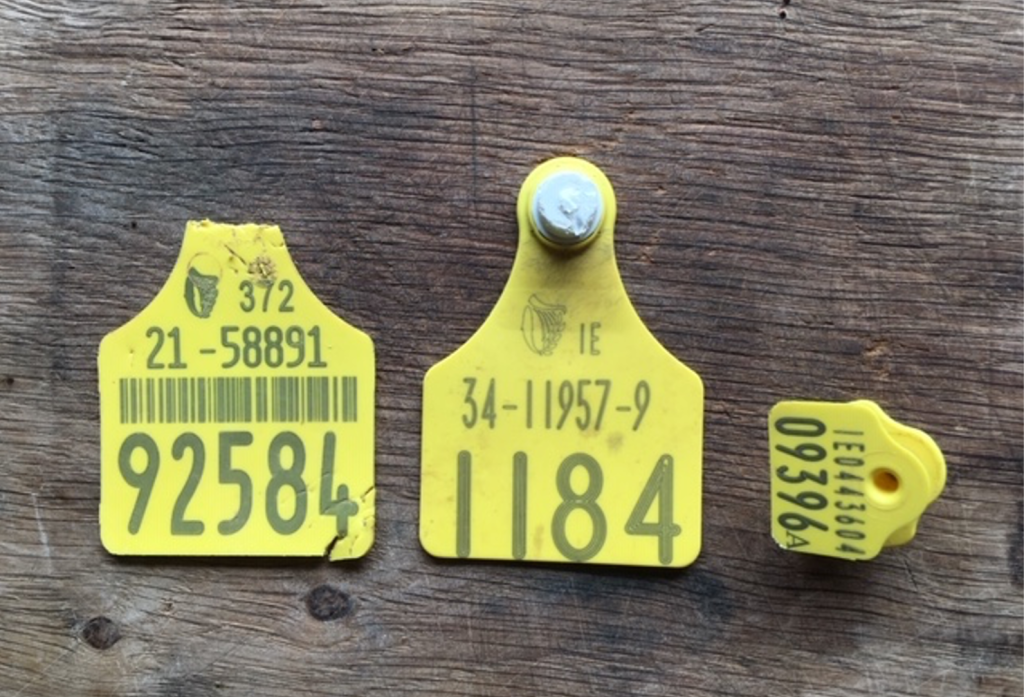
31 March
I found a small ear-tag stuck in the peaty soil up the mountain yesterday. I pocketed it.
Today I washed it. It has now been added to my collection of cow and sheep ear tags.
4 April
In the afternoon, a Garda car arrived. Our local TD was the passenger and a young uniformed Garda was driving. They came to see that we are all right in the lockdown. This checking up on isolated homes and older people is a safety gesture of the authorities. It is also a way for a new Garda to learn where people are living. Police recruits are trained in Templemore at the Garda College, and then they are sent all over the country. They are not sent to the place where they are from, so each new posting is full of strangers, never friends and family. Ideally, this ensures that there is less chance of them being compromised or corrupted, but it also means they do not know the back roads, the boreens, and the hidden-away places. The word Garda means ‘guardian’, which means that they are the protectors of the people, so in order to protect they need to know where everyone is.
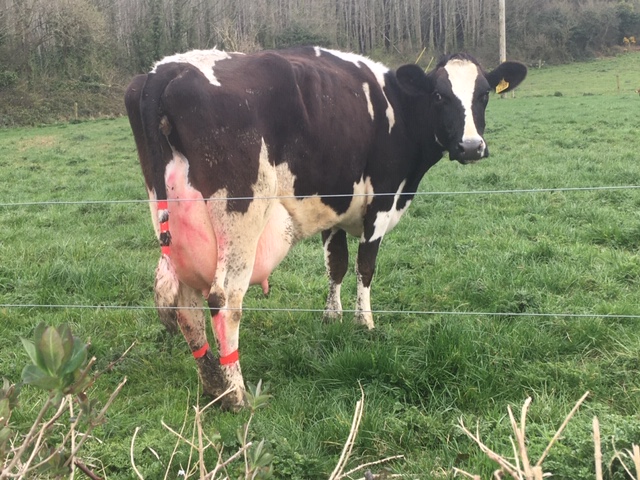
7 April
I was glad that I remembered to ask Joe about the red tape when I saw him. He told me that the cow is probably on a course of antibiotics. The red tape on her tail and her legs is there as an alert to ensure that her milk is not mixed with the milk of other healthy cows. He said that this is the system he uses for his herd and he is just assuming this is the case because the cow in question belongs to the other Joe. She is not one of his own cows. We are surrounded by fields all owned by two different men named Joe. Both Joes are dairy farmers. The Joe I spoke to could not give me a guarantee on this answer. He was only answering my query.
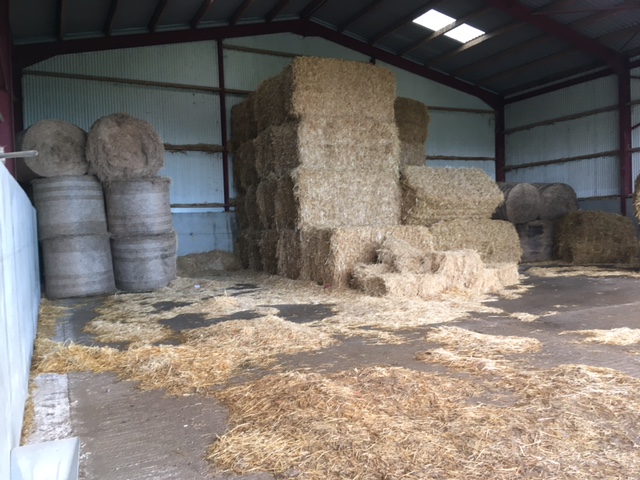
14 April
There is still a lot of hay stacked in the three-sided sheds. It takes a farmer weeks and weeks of work to get a shed stacked and full up with bales in preparation for winter. The removal of the hay then happens slowly over the winter months. Some years the farmers empty their sheds and run out of hay while the cows are still under cover. This year the cows are out in the fields and have been feasting on grass for several weeks. The grass is not growing fast, but it is growing. The cows are in the fields and there is still hay to fall back on. This is a sign that all is well.
18 April
The new ritual for funerals in this time of isolation is not the same as an actual funeral because people are not allowed to gather together for the wake in the family home nor for the mass in the church. An announcement is made on the radio. Tipp FM instructs mourners to pay their respects On The Road. The route the hearse is to take is announced for a certain time of day. The journey is planned to follow along the lanes and roads that the deceased travelled regularly. It involves a looping drive with the home place of the deceased as its centre. The arrival time at the church is announced too. People cannot attend the service, which is restricted to immediate family members only, but they are invited to stand outside their houses or beside their fields at the given time. They can stand inside their gate or outside their gate. They are welcome to stand respectfully as the dead person passes and to pay tribute in this quiet way. It is a surprise to see people standing all alone or in their family group at a gate far from anyone and far from any other house and crossing themselves when the hearse passes. Sometimes people applaud as a way to show appreciation for the life lived and the life lost.
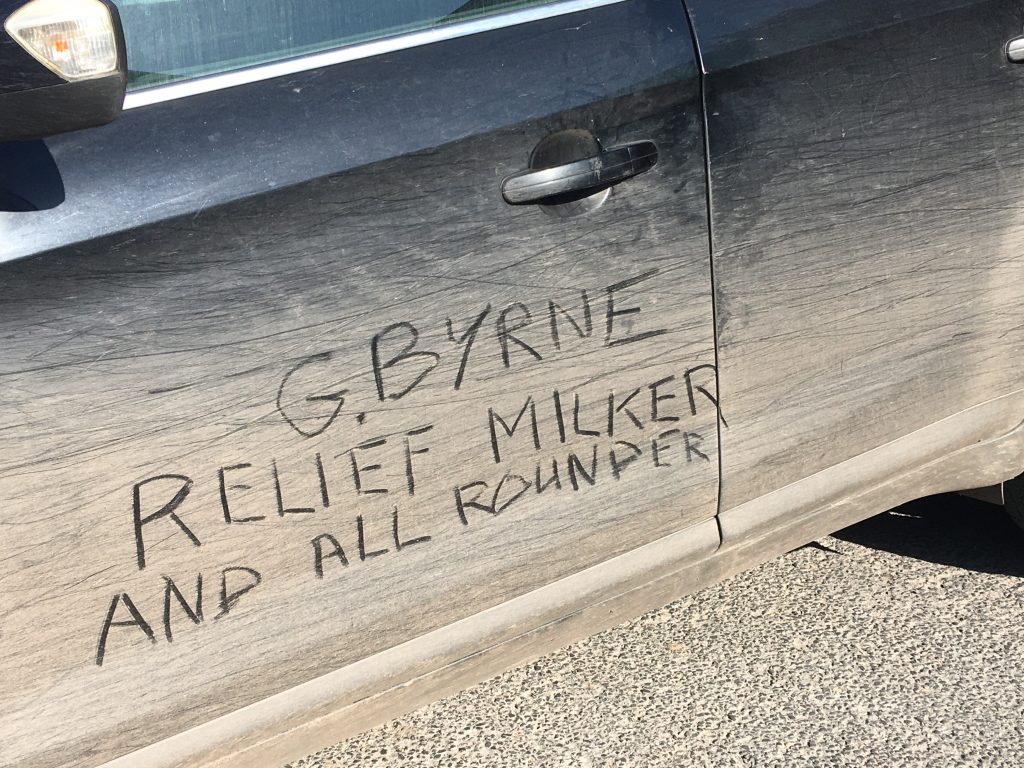
23 April
A Relief Milker is a someone who goes and helps out on a farm on an occasional basis. He does the milking and whatever other jobs need doing. These men move around the county helping out. Sometimes it is an older man, but mostly they are young men. Today I saw a fellow getting into his car down in the village. His services were advertised in the dried mud on his door: G.BYRNE. RELIEF MILKER AND ALL ROUNDER.
25 April
Stitchwort has taken over the hedgerows. Whenever I call a hedgerow a hedgerow, I am quickly corrected by anyone who hears me say the word. A hedgerow is not a hedgerow. A hedgerow is called a ditch. I should know better by now. I do know better, but I do forget.
Stitchwort and tufted vetch are the predominant blossoms of the moment and because the stitchwort flower is such a bright white it makes the ditches look polka-dotted from a distance. Vetch demands closer examination. I am fond of its leaves with the grasping tendrils at the end, but for the moment stitchwort is my favourite flower.
28 April
When the daily total of deaths from the Corona Virus are being reported they are not identified by town, nor by county. The deaths are listed by the totals in the East, South, and West of the country. The newsreader might announce twenty-two deaths in the East, two in the South, and seven in the West. The Republic is a complete country but the North of the Republic is never spoken of as a part of the country. The North of the Republic is not a place. When The North is spoken of, it means Northern Ireland. This is the North of the island. This is the North of Ireland. So there cannot be another North other than The North. There is only one North.
4 May
The weather is dry. It is too dry. The farmers need rain. Crops need a proper soaking rain.
We all need more rain. I have a mossy ground cover that I love because it creeps and covers things throughout the garden. Some people hate this plant because they consider it invasive. I cannot think of it as invasive. It is easy to get rid of it. It is easy to tear off a bit if it arrives in an awkward place. It provides a soft spongy cushion over rocks and hard surfaces. I was examining a clump of it today and remembering that Tim and Máiréad Robinson gave me a plastic carrier bag full of this plant many years ago. It was rampant in their damp garden in Roundstone. The Connemara climate was perfect for keeping it moist and happy. I brought my bagful home and I have had it growing here ever since. Máiréad told me that the local name for the plant was Welcome Home Dear Husband No Matter How Drunk You May Be, the idea being that if you fell onto an area covered with the plant after having Taken The Drink, it would soften your landing. Today we had news that both Tim and Máiréad have died of The Covid. I am glad that I have this small living thing to remind me of them.
Most people will remember Tim for his wonderful writing. I will, of course, remember that, but I am happy to have this tiny spreading plant from their garden. This little plant is impossible to kill.
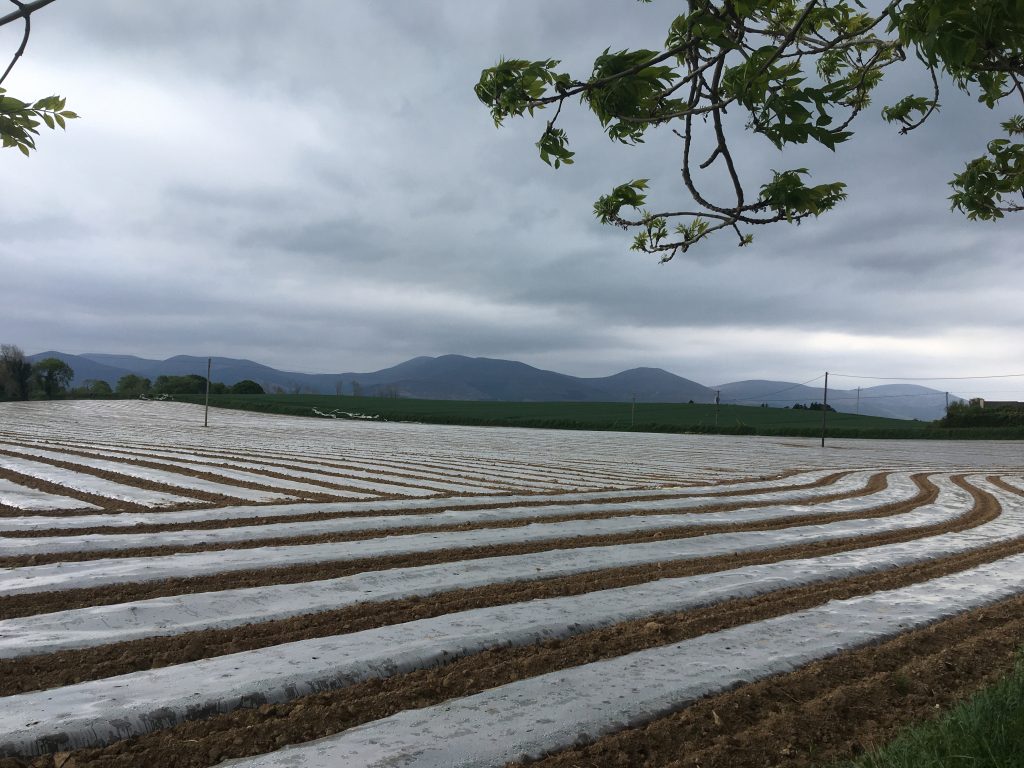
10 May
They are called Maize Strips. They appear each year in certain fields. They change the land. They define the curves of a field. They make everything look different. They make the fields beautiful. Maize Strips are made of a thin white plastic material extruded over the soil from a machine. The soil in between each section of the strips weighs the white strips down. Seeds are planted through slits in the plastic or underneath the plastic. I am not exactly sure how that works. The plastic then works like a little green house holding in the heat and encouraging growth. Corn grows through the plastic while the weeds are kept down. The white material is breaking down all the time as the corn gains strength and height. By the time the corn is one foot high, none of the white is visible. I wish that the Maize Strips were made of potato starch or some kind of material that breaks down and goes directly back in to nourish the soil. I wish they were not plastic, but they are.
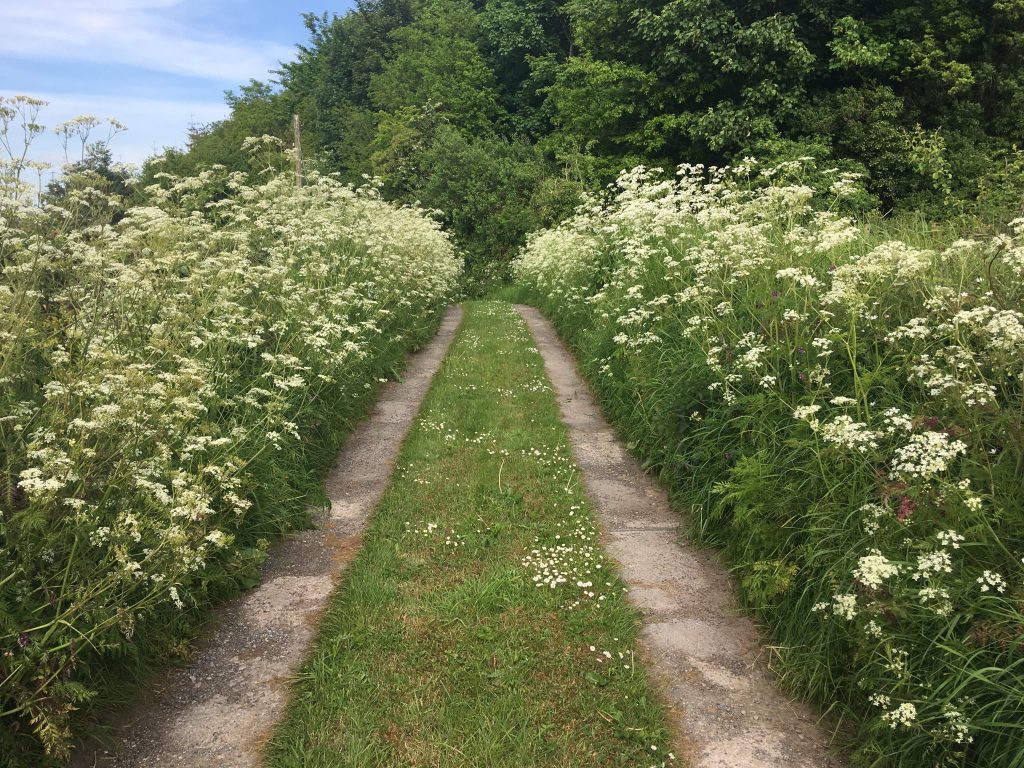
13 May
The boreen is becoming more narrow by the day. It is closing in. The stitchwort and vetch and bluebells, violets, primroses, and ferns are all getting overwhelmed by cow parsley. The cow parsley is lining the boreen and taking over the ditches. It is frothy and soft and nothing else has a chance to be seen. I delight in driving through it while it rubs both sides of the car. It is like going through a car wash without any water.
Erica Van Horn is American artist and writer, lives in Tipperary where, together with Simon Cutts, she works on the publications and projects of Coracle. Her online journal somewordsforlivinglocally.com has been the source of several books.
This text was originally published in PVA 13.

